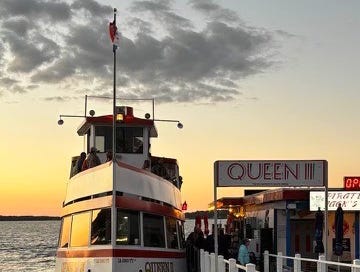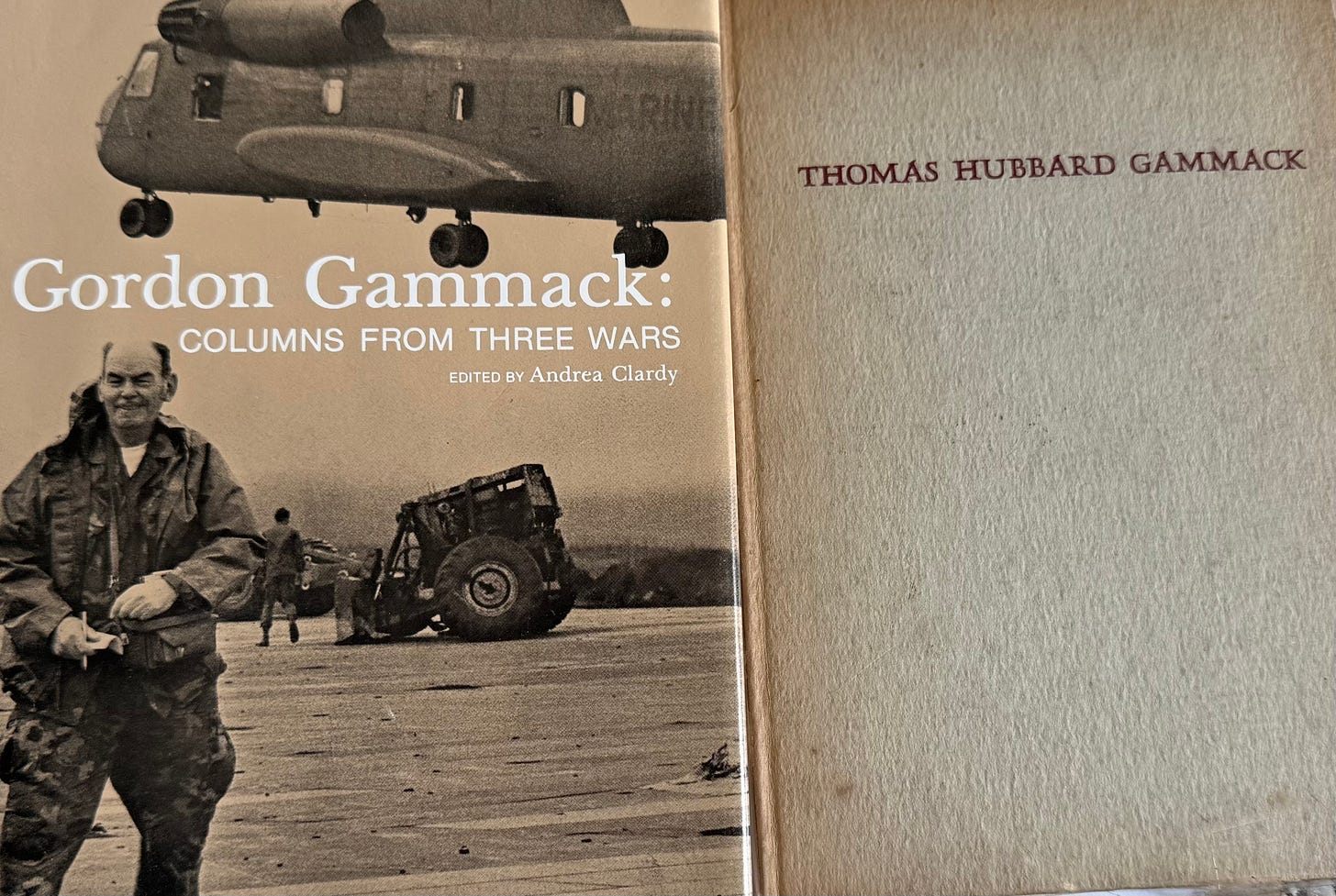Why Write Your Memoir?
There are only two things I’ve carried with me through every move I’ve made.
Let me count them: Eleven in the greater Des Moines area. One to Kelley. Then Madrid, Iowa. Rock Island. That’s just within Iowa. Three moves in the D.C. area. Two in Annapolis. Four in Chicagoland.
And through every relocation, I’ve packed the same two books—my only non-negotiables. Not for decoration. Not out of obligation. But because every time I open them, I learn something new—or rediscover something old—that suddenly makes sense.
The first is a collection of columns by my father, Gordon Gammack, written as a war correspondent covering WWII, Korea, and Vietnam for The Des Moines Register. The second is a tribute booklet from friends of an uncle I never met—Thomas Hubbard Gammack—who died at 40, just as he was stepping into national prominence.
On my mother’s side, I know almost nothing. My grandfather left the family to marry his secretary, Maude. We never met her. But Maude faithfully sent each of us five dollars for birthdays and Christmas—and we were expected to send handwritten thank-you notes to a stranger.
It wasn’t until later that I began to understand the pain that must have existed on all sides. Love can be messy. Divorce and remarriage came with heavy judgment back then. The baggage, though, stopped with my mother. All I know is that his name was Mark Hagensick, he worked in Iowa’s poultry industry, and he once lived in Elkader.
Maude—the mysterious gift-giver—left each of us grandchildren a remembrance in her will. That quiet, unsung gesture still sits with me.
I wish I had their stories. On paper. In their own words.
That’s what memoir can do. Whether your story reaches ten family members or a hundred thousand strangers, someone will treasure it. Maybe especially the estranged ones.
One of my most cherished books is that slim tribute to Uncle Thomas. From it, I learned he helped build Vermont’s first ski run. That his friend “Bunny” may be the reason we call beginner slopes “bunny hills.” That he died 85 years ago today from complications of the mumps. He had just become a governor of the New York Stock Exchange and was being tapped to help launch the SEC under FDR’s New Deal.
I never met him. But through that little book, I get a glimpse.
Have You Considered Writing a Memoir—But Don’t Know Where to Start?
You’re not alone. More than 40% of this year’s Okoboji Writers’ and Songwriters’ Retreat participants say they want help with memoir.
Whether you’re trying to get started, fine-tune a draft, or pitch a finished manuscript, we’ve got you covered.
We’ve lined up a remarkable team of speakers: bestselling memoirists, seasoned writing coaches, and even a literary agent actively seeking memoir submissions.
Before we get to the list, take a few minutes to meet Maura Casey, a former New York Times editorial writer and author of Saving Ellen. Her newly released memoir is raw, gripping, and urgently needed.
In this interview, Maura talks about facing the hardest parts of her story—and how she found the courage and craft to bring it to life on the page.
The names below that appear in green link to each author’s Substack column.
Have You Considered Writing a Memoir—But Don’t Know Where to Start?
You're not alone. More than 40% of this year’s Okoboji Writers’ and Songwriters’ Retreat participants say they want help with memoir writing. Whether you’re trying to get started, refine your draft, or pitch a finished manuscript, we’ve got you covered.
We’ve assembled an inspiring lineup of speakers—memoirists, writing coaches, even a literary agent actively looking for memoir submissions—ready to help you bring your story to life.
Before we get to that list, take a few minutes to meet Maura Casey, a former New York Times editorial writer and author of Saving Ellen, her newly released memoir.
Maura’s story is gripping. It’s also difficult, raw, and deeply important.
In this interview, she talks about writing her own traumatic family history, and how she found the courage—and craft—to put it on the page.
The names below that appear in green link to the author’s Substack column.
Sign up by clicking:
Ana McCracken
Inspire Your Writing—A Writing Practice Workshop I & II
File Your Darlings—Everything Doesn't Belong
Annie Leonard
Dead Folks Tell the Best Tales: A Workshop on Writing the Stories Behind Your Genealogy
Why Anyone Else Cares About Your Memoir
Mechanics of Memoir
Beth Howard
Finish Your Dmn Book!*
How to Make a Documentary Film When You Have No Idea What You're Doing
Courtney Crowder
How to Write Stories People Actually Want to Read
Documentary Panel
Jazz and Journalism
Writing Your Life Through Memoir
Spiritual Nonfiction: Writing to Inspire
Elizabeth Kracht
How to Find a Literary Agent
Self-Editing for Fiction and Memoir Writers
Beginning Your Memoir
Writing with Vulnerability
New Ways of Looking at the Memoir
Ten Lessons in Memoir
Michelle Cowan
How to Market Your Self-Published Book
Storytelling and Memoir Presentation







I hope people will consider coming to the retreat--even those who are only considering a memoir. All the workshops (mine included!!) can help get you grounded in your work, and headed in a manageable direction. I think it is blissful to be around so many great people, on a lake, talking about writing. What could be better??
Thanks, Julie... perhaps it's not ironic that your family history contains similar "shameful" events to mine… and your father was so instrumental in the "good" things that led to fame and fortune for my family! (Heck, I wouldn't be here if not for your dad.) And here I am, completing my bio-fiction (memoir?) about N'west Iowa's own Pettit Family Singers, a.k.a. George Gobel's "Kids Next Door." (Check your dad's many columns about them.) Thanks for all your pointers along the way. Break a leg at Okoboji!